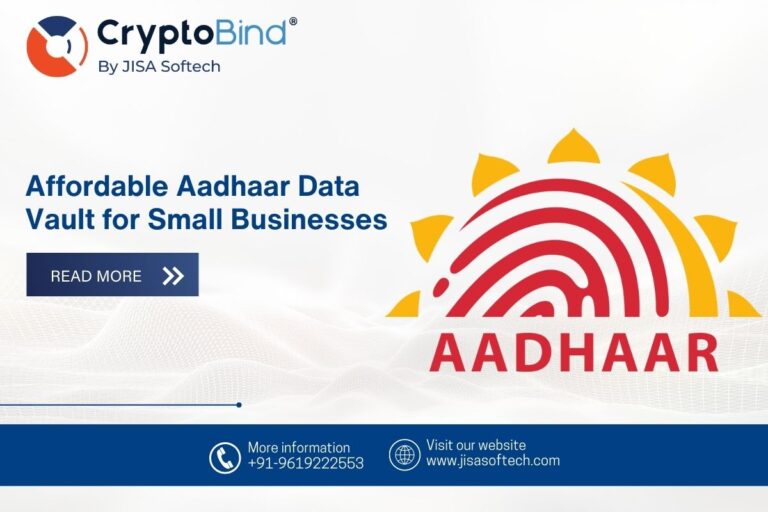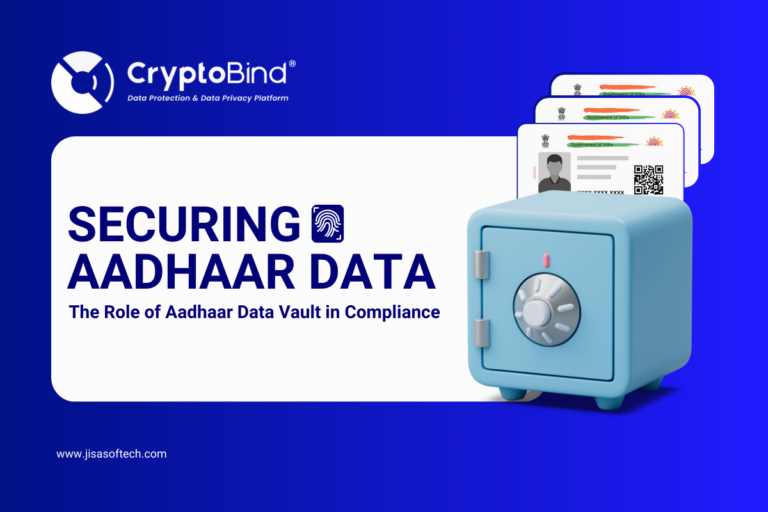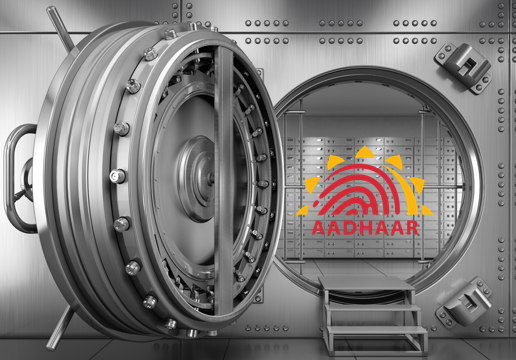Aadhaar Data Vault and Regulatory Compliance: Ensuring Secure Storage and Usage
The Unique Identification Authority of India (UIDAI) is responsible for issuing unique identification numbers known as Aadhaar to all residents of India. This 12-digit unique number is provided after verifying enrollees’ demographic and biometric data. Given the importance and sensitivity of the information involved, UIDAI must protect individuals’ identity information and authentication records to ensure compliance with the regulatory framework.
In response to this, UIDAI introduced Aadhaar Data Vault, a secure storage system for handling an individual’s Aadhaar data. This article will explore the benefits, objectives, and working of Aadhaar Data Vault, including its approaches, reference keys, and critical points to consider.
What Is an Aadhaar Data Vault?
An Aadhaar Data Vault is a digitally secure system designed to store and share an individual’s Aadhaar data with authorized entities. The Aadhaar Data Vault operates under strict regulatory guidelines to safeguard personal information, ensuring unauthorized access is not possible. The system is accessed through a unique reference key issued to the individual during enrolment.
Benefits of an Aadhaar Data Vault
The Aadhaar Data Vault offers several advantages to individuals and organizations:
- Safe and Secure: The data vault maintains high levels of encryption to protect personal data and prevent unauthorized access.
- Easy Access: Individuals can access their Aadhaar data anytime and anywhere using their Aadhaar number and authentication.
- Portability: Aadhaar data can be easily shared with third parties such as banks, telecom providers, and other government entities for authorized purposes.
- Convenience: The system eliminates the need to carry physical Aadhaar cards, allowing access to data via mobile devices.
- API Solutions: API-based technologies facilitate seamless integration with various business lines for efficient data handling.
Who Requires an Aadhaar Data Vault?
All agencies that handle Aadhaar data, including Authentication User Agencies (AUAs), eKYC User Agencies (KUAs), and Sub-AUAs, must set up an Aadhaar Data Vault. Organizations that need to maintain Aadhaar numbers in an organized, electronic format for internal identity requirements are also required to establish the data vault. This includes institutions managing attendance systems, provident fund accounts, ration distribution, scholarships, financial transactions, and other services.
Reference Keys for Aadhaar Data Vault
Reference keys are unique identifiers generated during Aadhaar enrolment and are essential for accessing the Aadhaar Data Vault. These keys, a combination of the Aadhaar number, enrolment ID, and timestamp, are challenging to replicate. They enable users to retrieve encrypted information and share their Aadhaar data with authorized entities.
The reference key replaces the actual Aadhaar number in databases and logs, ensuring that data is securely stored and not exposed. Organizations must use Hardware Security Module (HSM) devices to store reference keys for encryption, protecting the data and complying with UIDAI’s standards.
Ensuring UIDAI Compliance :
UIDAI’s regulations outline key standards that organizations must adhere to, focusing on access control, encryption, key management, database logging, and tokenization of Aadhaar numbers. Let’s delve into these requirements:
- Access Control: Only authorized individuals should access UIDAI information facilities, ensuring the security of authentication servers and application source code.
- Encryption: Personal Identity Data (PID) blocks must be encrypted during transit and at rest, adhering to UIDAI’s API specifications. Encryption keys must undergo comprehensive management throughout their lifecycle.
- Database Logging: Critical user activities and security events must be logged and monitored regularly, with access restricted to authorized personnel.
- Tokenization: Aadhaar numbers should be stored in a secure “Aadhaar Data Vault,” with each number mapped to a reference key. Organizations must use this reference key instead of the Aadhaar number for all business transactions.
- Use of HSMs: Aadhaar numbers and associated data stored in the Aadhaar Data Vault must remain encrypted, with access tightly controlled and encryption keys stored in FIPS 140-2 Certified HSM devices.
By adhering to these regulations, organizations ensure the integrity and security of Aadhaar data, mitigating the risk of unauthorized access or breaches. Compliance not only fosters trust among stakeholders but also demonstrates a commitment to data protection and regulatory standards.
In conclusion, the Aadhaar Data Vault plays a crucial role in ensuring the secure and compliant handling of Aadhaar data. By adhering to UIDAI’s regulations and guidelines, organizations can maintain high standards of data security and integrity while providing convenient and accessible services to their customers.
In an era where data security is paramount, safeguarding personal information like Aadhaar data is crucial. By implementing CryptoBind® Aadhaar Data Vault, we ensure that your Aadhaar data remains inaccessible to unauthorized entities, securing it with the utmost privacy and protection. For more details on how we can strengthen the security of your Aadhaar data, don’t hesitate to reach out to us. Your data’s safety is our priority.
Contact Us:
Sales@jisasoftech.com
+91-9619222553







